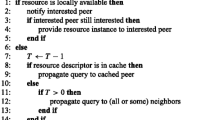Abstract
Business and engineering systems are increasingly being created as collections of many autonomous (human or software) agents cooperating as peers. Peer-to-peer coordination introduces, however, unique and potentially serious challenges. When there is no one ‘in charge’, dysfunctions can emerge as the collective effect of locally reasonable decisions. In this paper, we consider the dysfunction wherein inefficient resource use oscillations occur due to delayed status information, and describe novel approaches, based on the selective use of misinformation, for dealing with this problem.
This is a revised version of a paper submitted to the Agents for Business and Engineering Systems track of the 2004 Conference on Autonomous Computing and Agents for Business Automation.
Preview
Unable to display preview. Download preview PDF.
Similar content being viewed by others
References
Jensen, D., Lesser, V.: Social pathologies of adaptive agents. In: Safe Learning Agents Workshop in the 2002 AAAI Spring Symposium. AAAI Press, Menlo Park (2002)
Chia, M.H., Neiman, D.E., Lesser, V.R.: Poaching and distraction in asynchronous agent activities. In: Proceedings of the Third International Conference on Multi-Agent Systems, Paris, France (1998)
Hardin, G.: The Tragedy of the Commons. Science 162, 1243–1248 (1968)
Youssefmir, M., Huberman, B.: Resource contention in multi-agent systems. In: First International Conference on Multi-Agent Systems (ICMAS 1995). AAAI Press, San Francisco (1995)
Sterman, J.D.: Learning in and about complex systems, p. 51. Alfred P. Sloan School of Management, Massachusetts Institute of Technology, Cambridge, Mass (1994)
Kephart, J.O., Hanson, J.E., Greenwald, A.R.: Dynamic pricing by software agents. Computer Networks: the International Journal of Distributed Informatique 32(6), 731–752 (2000)
Ranjan, P., et al.: Decision Making in Logistics: A Chaos Theory Based Analysis. In: AAAI Spring Symposium on Diagnosis, Prognosis and Decision Making (2002)
Klein, M., et al.: The Dynamics of Collaborative Design: Insights From Complex Systems and Negotiation Research. Concurrent Engineering Research & Applications 11(3), 201–210 (2003)
Hewitt, C., Jong, P.D.: Open Systems. Massachusetts Institute of Technology (1982)
Hogg, T.: Controlling chaos in distributed computational systems. In: SMC 1998 Conference Proceedings, pp. 632–637 (1998), (98CH36218)
Osborne, M.J., Rubinstein, A.: A course in game theory, vol. xv, p. 352. MIT Press, Cambridge (1994)
Challet, D., Zhang, Y.-C.: Emergence of Cooperation and Organization in an Evolutionary Game. arXiv:adap-org/9708006, 2(3) (1997)
Zhang, Y.-C.: Modeling Market Mechanism with Evolutionary Games. arXiv:condmat/9803308, 1(25) (1998)
Hogg, T., Huberman, B.: Controlling chaos in distributed systems. IEEE Transactions on Systems, Man & Cybernetics 21(6), 1325–1332 (1991)
Youssefmir, M., Huberman, B.A.: Clustered volatility in multiagent dynamics. Journal of Economic Behavior & Organization 32(1), 101–118 (1997)
Klein, M., Bar-Yam, Y.: Handling Resource Use Oscillation in Multi-Agent Markets. In: AAMAS Workshop on Agent-Mediated Electronic Commerce V, Melbourne Australia (2003)
Metzler, R., Klein, M., Bar-Yam, Y.: Efficiency Through Disinformation. New England Complex Systems Institute (2004), http://www.arxiv.org/abs/cond-mat/0312266
Bar-Yam, Y.: Dynamics of complex systems, vol. xvi, p. 848. Addison-Wesley, Reading (1997)
Braden, B., et al.: Recommendations on Queue Management and Congestion Avoidance in the Internet. Network Working Group (1998)
Author information
Authors and Affiliations
Editor information
Editors and Affiliations
Rights and permissions
Copyright information
© 2005 Springer-Verlag Berlin Heidelberg
About this paper
Cite this paper
Klein, M., Metzler, R., Bar-Yam, Y. (2005). Handling Emergent Resource Use Oscillations. In: Barley, M.W., Kasabov, N. (eds) Intelligent Agents and Multi-Agent Systems. PRIMA 2004. Lecture Notes in Computer Science(), vol 3371. Springer, Berlin, Heidelberg. https://doi.org/10.1007/978-3-540-32128-6_9
Download citation
DOI: https://doi.org/10.1007/978-3-540-32128-6_9
Publisher Name: Springer, Berlin, Heidelberg
Print ISBN: 978-3-540-25340-2
Online ISBN: 978-3-540-32128-6
eBook Packages: Computer ScienceComputer Science (R0)




